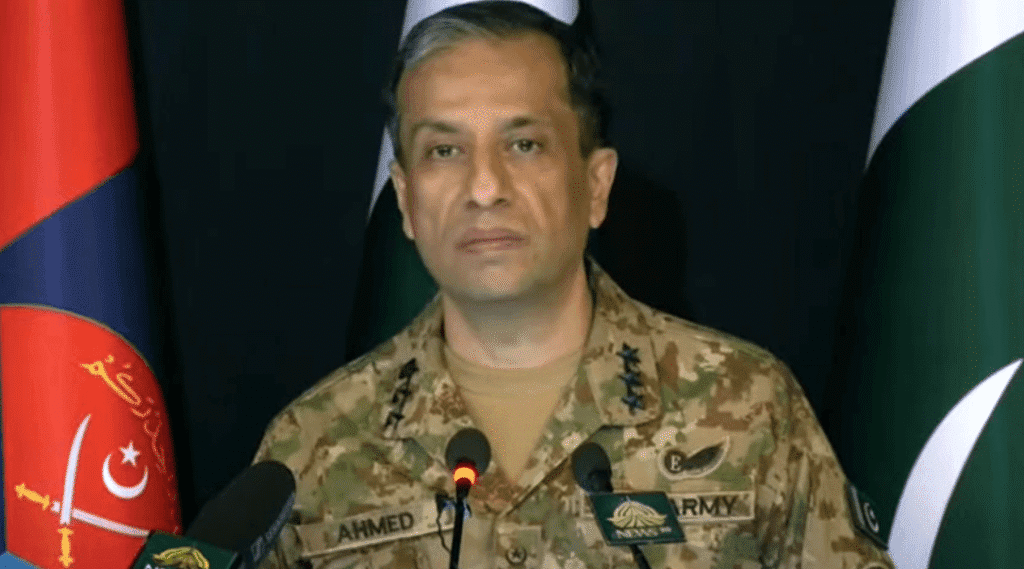Military Spokesperson Exposes Indian Involvement in Terror Networks Across Pakistan
Pakistan’s Director General of Inter-Services Public Relations (DG ISPR), Lieutenant General Ahmed Sharif Chaudhry, has provided concrete evidence of India’s involvement in state-sponsored cross-border terrorism, particularly in Balochistan. Addressing the media in an important press conference, DG ISPR rejected India’s baseless accusations following the Pahalgam attack, asserting that India has yet to present any evidence to substantiate its claims against Pakistan.
The Pahalgam attack, which occurred on April 22 in Indian-occupied Kashmir, saw 26 individuals, mostly tourists, killed. In response, India quickly blamed Pakistan without presenting any proof, leading to diplomatic escalations, including the suspension of the Indus Water Treaty (IWT). However, Pakistan strongly rejected these accusations, with Prime Minister Shehbaz Sharif calling for a neutral investigation into the attack.
DG ISPR, during his briefing, presented irrefutable evidence of India’s support for terrorist activities within Pakistan. He revealed that India has been actively operating and funding terrorist networks on Pakistani soil, particularly in Balochistan. “We will present how India has been running a terror network inside Pakistan, supplying explosives and IEDs to terrorists targeting both military personnel and civilians,” said Lt-Gen Chaudhry.
The military spokesperson shared details of a key arrest on April 25, when a Pakistani citizen, trained by India, was apprehended near Jhelum. From the suspect, security forces recovered an IED, two mobile phones, and Rs 70,000, along with an Indian-origin drone and Rs 1 million in cash from his home. Forensic analysis of the materials pointed directly to India’s involvement in these acts of terrorism. A junior commissioned officer (JCO) of the Indian Army, identified as Subedar Sukvinder, was revealed to be the handler behind the operation, sending instructions for the IED and providing financial support.
DG ISPR further highlighted the involvement of several Indian Army officials, including Major Sandeep Verma, Subedar Sukvinder, Havildar Amit, and another unnamed soldier, who were implicated in the terrorist operations inside Pakistan. Lt-Gen Chaudhry also played an audio exchange between Major Sandeep and a terrorist, which revealed detailed plans for terrorism across various regions, including Balochistan and Lahore. “This is irrefutable evidence of state-sponsored terrorism,” Chaudhry stated.
The DG ISPR elaborated that the terrorist in question had been involved in four attacks using IEDs, with the explosives being transported via drones. He clarified that these activities were not orchestrated by India’s intelligence agency, RAW, but by the Indian military itself, underscoring the involvement of active serving officers in these covert operations.
The evidence presented by the military highlighted how India has been using its army to fund and coordinate terrorism in Pakistan. “The terrorist’s fourth attack was planned to coincide with the Pahalgam incident, indicating a direct link to the escalation of violence post-attack,” he noted.
Furthermore, DG ISPR stated that following the Pahalgam incident, India had directed all its terrorist assets, including groups like the Tehreek-i-Taliban Pakistan (TTP), to increase their activities in Balochistan and other regions. He also revealed that security forces recently killed 71 terrorists, including 54 trying to infiltrate from Afghanistan.
In a separate development, Pakistan’s military shot down an Indian quadcopter drone near the Line of Control (LoC) in Azad Jammu and Kashmir. This comes amid heightened tensions, with Pakistani and Indian forces exchanging fire for five consecutive nights, marking a significant escalation after years of relative calm along the border.
Meanwhile, Pakistan’s Interior Minister, Mohsin Naqvi, stated that the situation at the border was being closely monitored, warning that any incursions by India would be met with a robust response. He suggested that India’s actions might be driven by domestic political motives, particularly in the run-up to elections.
Earlier, Pakistan’s Mission to the United Nations also presented evidence of external sponsorship for the Jaffar Express attack, linking it to regional adversaries. The train hijacking incident in March, carried out by the Balochistan Liberation Army (BLA), further demonstrated the growing threat from India-backed groups operating against Pakistan.
The DG ISPR’s revelations underline the growing threat posed by India’s state-sponsored terrorism and its destabilizing activities in the region, calling for international recognition and a coordinated effort to combat such terrorism.
